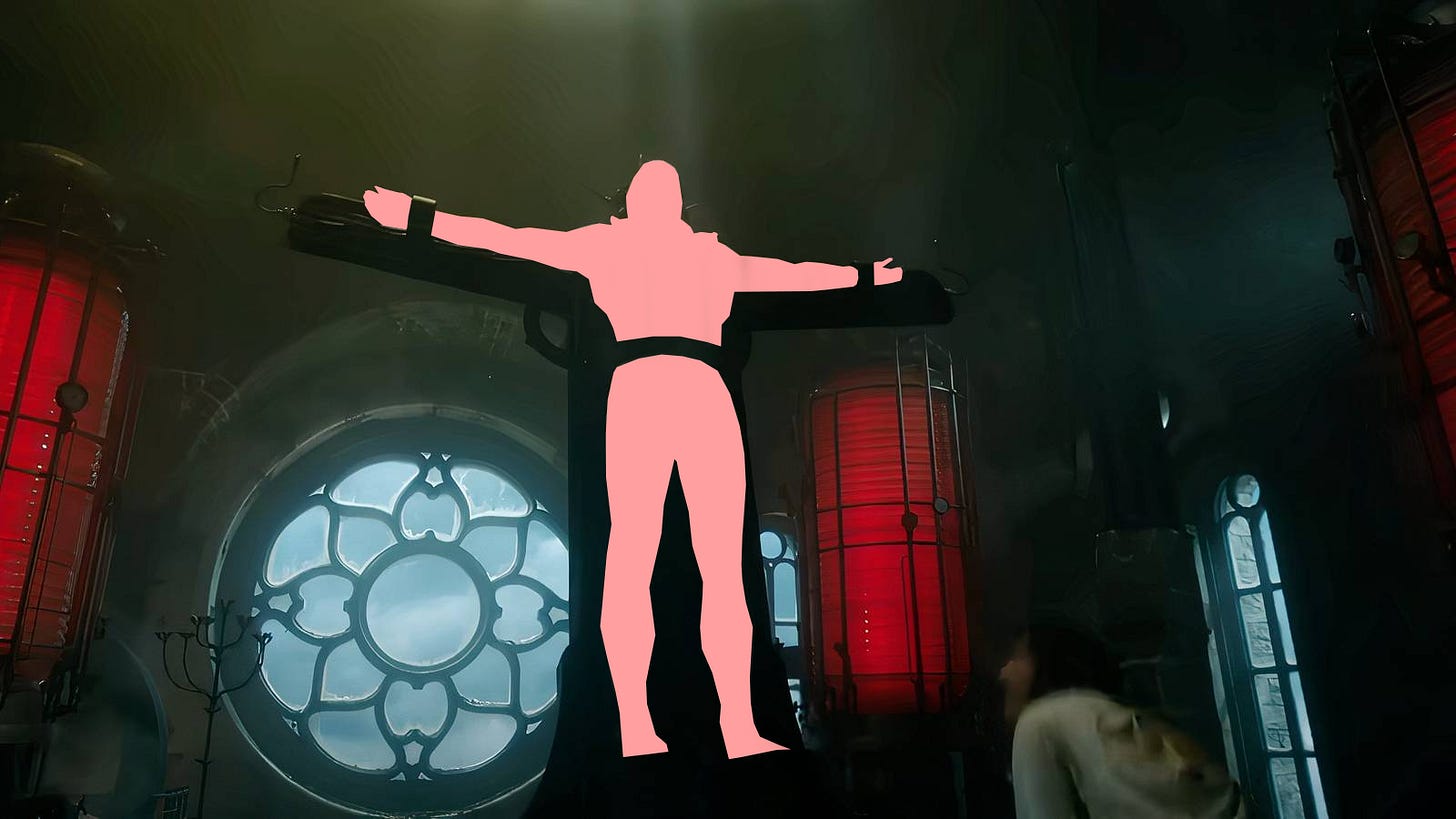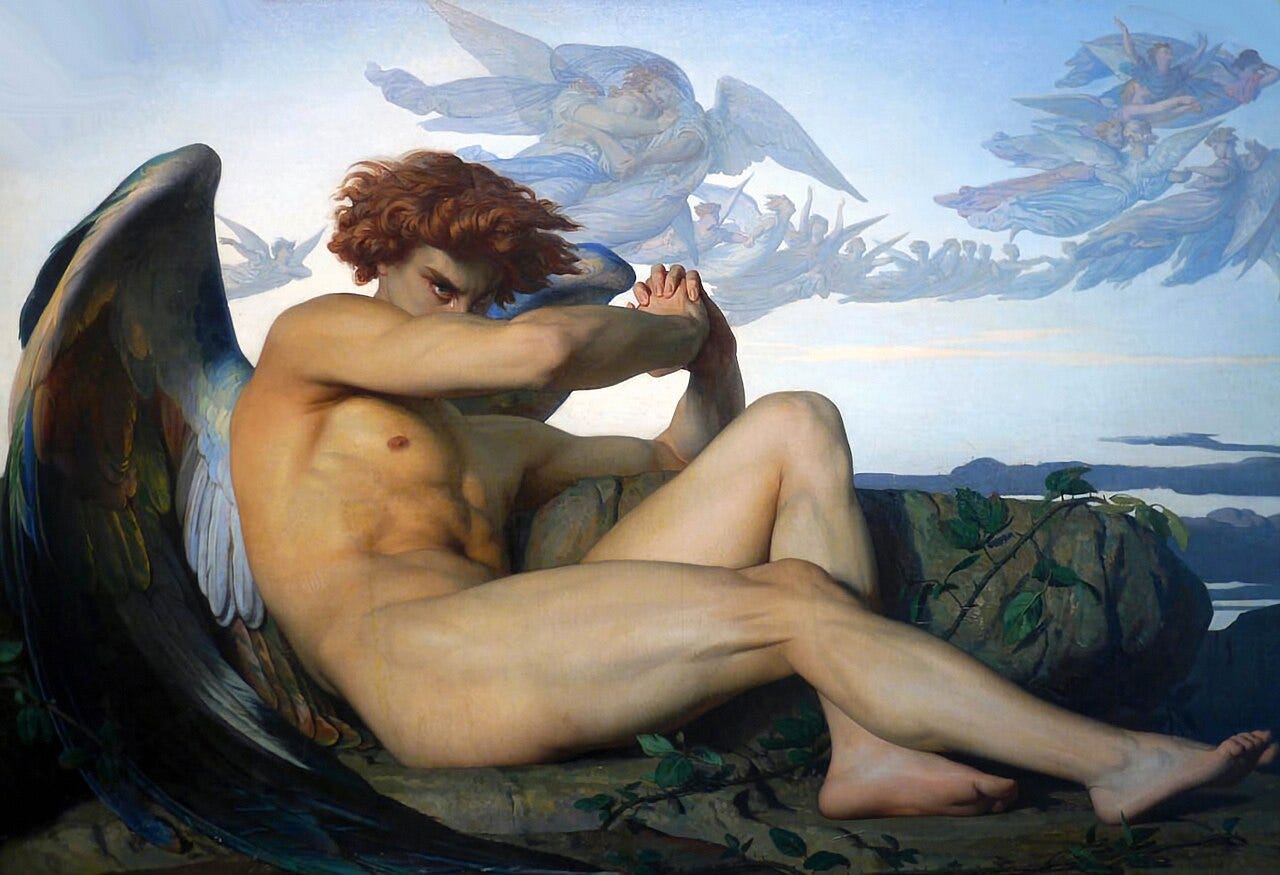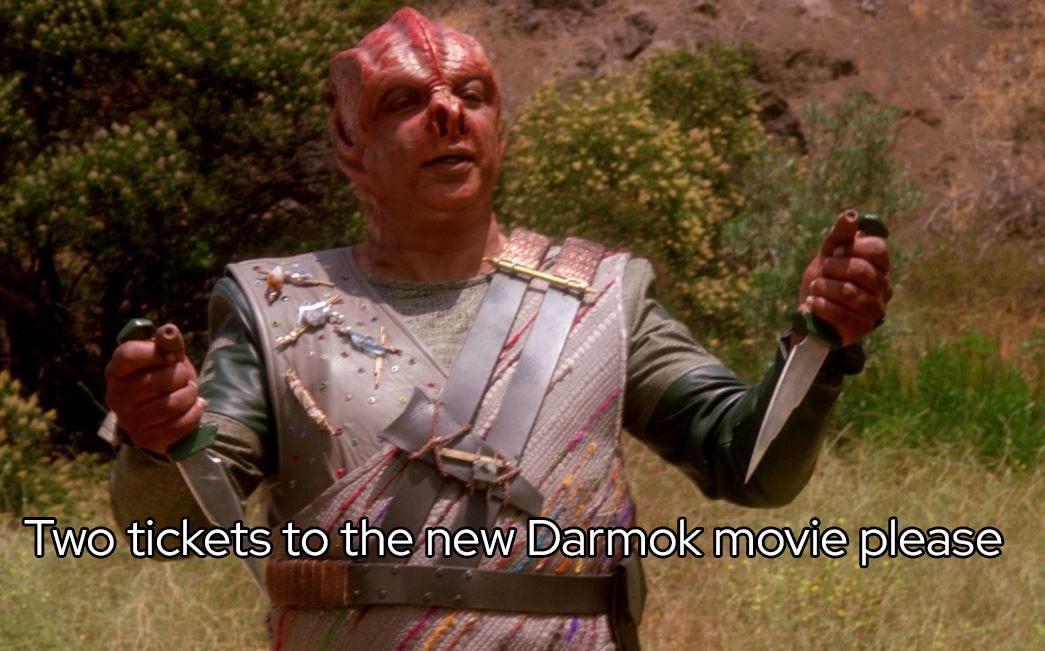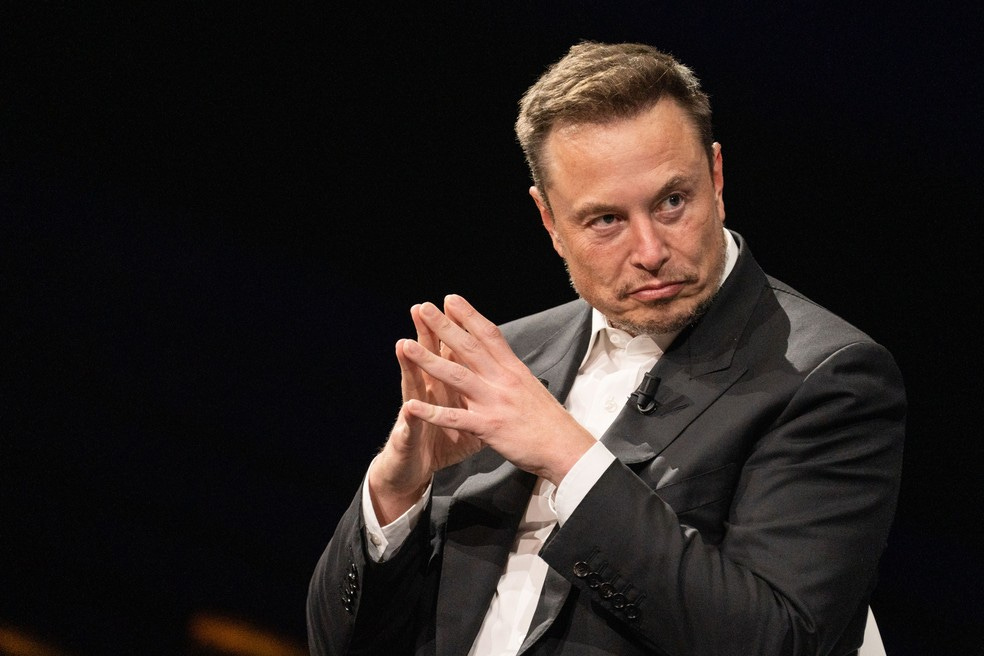Frankenstein (The Creature) Does Not Exist
on alternate understandings of core cultural myths
So I saw Guillermo Del Toro’s Frankenstein. I think it’s very well made with strong performances and excellent reliance on traditional effects, and although I never assumed that the notorious GDT would be the kind to just slap a prompt into generative AI to make his art, it was at least entertaining to see him declare “I’d rather die” than use AI in the production of his film. It was an ironic question for anyone to even bring to the man who made Shape of Water and who recently used his Hollywood Walk of Fame Star acceptance speech to tell immigrants to America:
“Do not believe the lies they tell about us. Believe in the stories you have inside and believe that we all can make a difference and we all have stories to tell and we all can contribute to the art and the craft and the world in any way we see fit”.
It was ironic because AI represents in its origin, cultural position, aesthetics and use everything that Guillermo Del Toro isn’t. The political alliance between Silicone Valley and the second Trump administration is the main economic force keeping fascist America upright at the moment. If you like we could even say it is a reanimating force that keeps the already dead empire lurching and jerking forwards miraculously stitched together by political marriages of convenience, but I think this analogy would also rub Del Toro up the wrong way, given that he has made his incredible career around a centering of the monstered, the other, and in finding sympathy for the strange. This of course is the irony to which I am referring, AI is a scam pushed by the most obsessively normative, chauvinistic and dominance-minded men in our culture.
But back to the film.
Ever since the first announcement of the project, Del Toro and Frankenstein seemed like a dream pairing. Del Toro said in 2007 that he would “kill to make” an adaptation that explores the story as a “Miltonian tragedy”. For my readers who haven’t read Paradise Lost, (which honestly who has the time? just get ChatGPT to summarise it for you) the specific parallel between it and Frankenstein is to do with the central themes of hubris, doomed creation and the tragedy of realising that your place in the world is a lowly and detested one. Victor Frankenstein in Frankenstein and God in Paradise Lost are characters that through ability and ambition have made perfect children, only to cast them out and forsake them when they protest the conditions of their existence. The Creature in Frankenstein and Lucifer in Paradise Lost both tell a side of the supposed hero’s story that recasts them as an egotistical villain whose act of creation even is no generosity but rather, poisoned by the creator’s wrath, is an act of control, domination and greed.
Lucifer declares to the world “It is better to reign in hell than to serve in heaven”
Incidentally - I’m not sure if Lucifer is in or just outside Heaven, or already in the Abyss in Cabanel’s painting The Fallen Angel, but I am sure he’s serving.
Assessed against the pattern of Paradise Lost, I think that Del Toro’s Frankenstein is a rousing success. The Creature learns the ways that violence perpetuate in the world, saying that “the hunter doesn’t hate the wolf and the wolf doesn’t hate the sheep”. He stays for a while with a kind old blind man who teaches him language spoken and written, and then the old man is killed by wolves and the Creature is chased away by the old man’s family who find him monstrous, leading him to his tragic self-determination that he will always be a hideous thing. The story shows us that gentleness is possible for the Creature but also conspires to show us why he would come to the conclusion he does. The tragedy is that the creation becomes like his creator by accepting that horror and cruelty are the natural way of the world. The parallel between the Creature and Lucifer is pulled off perfectly. They deserved to be created by someone who had kindness in their heart.
Victor Frankenstein meanwhile gets just about every signal he could that he is a bad man who should stop now please. If it weren’t enough that his main field of study is stitching corpses together and zapping them until they exist in a horrifying state suspended life and death, he narrates that he is aware from a young age that he is the shitty brooding emo son and his younger brother William is a ray of sunshine who everybody just loves. When William is mortally wounded in the third act, he tells Victor as he dies “you are the monster” and then they both look right at the camera and say “this is the point of Frankenstein (2025), Victor is the real monster”. Sorry, some of that didn’t actually happen. Maybe ask ChatGPT to summarise the plot if you haven’t seen it.
I don’t so much want to actually discuss Frankenstein (2025), I’ve actually come here mainly to discuss Frankenstein (1818), the original novel by Mary Shelley titled Frankenstein; or, The Modern Prometheus. The story was written originally during the famous year-without-Summer 1816 where due to environmental conditions it rained all through the sunny season, and Mary Shelley, her husband Percy, Lord Byron and John Polidori had a writing competition which produced both Frankenstein, heralded as the world’s first science fiction story and Polidori’s The Vampyre, a precursor to modern vampire stories such as Bram Stoker’s Dracula and (it has been argued) a seductive mythologisation of Lord Byron himself, who Polidori was doing a big gay with.
I have always found it notable that Mary was the only woman in this writing competition, and as such found Frankenstein much more to be about the duality of men than the duality of man. Victor Frankenstein is arrogant, self-obsessed, cruel, indifferent to any duty of care that he might have, and the Creature is an innocent brought into the world with boundless potential whose traumatisation by his father turns him into a monstrous reflection of his creator. To me this gendered context is inescapable in Frankenstein and any reading (or adaptation) is lost without it. After all it was men who were driving the hubristic violation of nature in the 19th Century that Mary chose to write about, and it still is today.
In 2025 it feels like we are once again in a year without sunshine, at least metaphorically, and both the Vampyre - visiting us as Robert Eggers’ Nosferatu - and now Victor and the Creature are back with us. We are being given new canonical tellings of these stories which are such cultural juggernauts. I liked both movies well enough, but came out of both with the same feeling - that the version of the story told on screen lends itself to only one real reading, and that this is limiting when the stories are so ubiquitous in our culture as be everyday linguistic metaphors. To call someone “Dracula” carries an enormous amount of highly specific but also nebulous meaning, and to liken someone to Victor Frankenstein does too.
I would like to take the opportunity of the film’s release to describe a reading that has stuck with me since I first read the novel and which I have rarely seen anyone else discuss:
The Creature does not exist.
In the novel, Victor Frankenstein is a troubled young man. The death of his mother drives him to a depth of grieving insanity that then spurs him on through the rest of his entire life to pursue and defeat death itself. He becomes fixated upon the idea that modern medicine has strayed in the wrong direction, away from what it considers debunked classical ideas, and argues with his teachers that by using these antequated frameworks and methods he can achieve more. This is the first point at which to me the story suggests that Frankenstein is detached from reality. He has responded to grief with an intense, even all-consuming obsession and has found himself standing against the collective research and methodology of basically every other scientist in the world.
From here in terms of interpersonal relationships, Victor Frankenstein experiences a harsh dichotomy between periods where he is supported by friends, seeing other people, mentally well and his life is relatively easy, and periods where he retreats, becomes reclusive and obsessed with his work and then later where he is visited by the Creature repeatedly. After he brings it to life in his laboratory he flees the scene, not showing the Creature to anyone nor telling them about it, and when he returns it has disappeared. He spends the next extended period resting and recovering and becoming generally more mentally well.
Then tragedy strikes Victor once again, in the death of his brother.
(Here I wanted to point out this line describing him walking to the place where his brother died, not because it’s relevant to my analysis but just because it’s stuck with me since first reading and I wanted to credit Mary Shelley with this piece of prose:
”While I watched the storm, so beautiful yet terrific , I wandered on with a hasty step. This noble war in the sky elevated my spirits”)
and immediately after this, Victor sees the Creature again. In a straightforward reading of the story, he sees the Creature and realises that it has killed his brother and then goes to the people who are investigating and disproves the guilt of the accused Justine Moritz. In the Creature does not exist reading, he begins to shear away from reality upon the wounding of his psyche once again with immediate familial grief. I think everyone who has lost someone close can understand this.
Justine Moritz, who we are told is too meek and nice to have committed a murder, has confessed to the crime before Victor even arrives, but once he is there (at least in his telling) she says that her confession was coerced, they establish an alibi and then she is freed. It would be somewhat trivial for Victor at any point here to say “I know who did the murder, there is a horrible monstrous corpse like man wandering the hills and it was him who killed my brother”, but instead Victor holds onto the belief that the Creature did it, and proves Justine’s innocence through other methods. Here I think we could interpret Victor as suffering a kind of positive sexism. He doesn’t believe Justine could have done it because it is an evil act of which women are incapable. I don’t think Justine’s guilt is a necessary pillar of the Creature does not exist reading, but I think that the way Victor responds to his grief by immediately manifesting the Creature and then shows up and refuses to even momentarily entertain the idea of Justine’s guilt is striking. It is also stated that the motive that had been attributed to Justine was effectively jealousy of the Frankenstein brothers’ mother. She was their nursemaid and raised them from birth, and they idolised their posh dead mother who was perfect in their eyes while Justine performed the day-to-day labour of bringing them up. There is a powerful gendered class dimension to the story in which Justine did kill William, but again, I don’t need this to be true, as Victor doesn’t actually use the Creature’s guilt to explain Justine’s innocence.
After this, Victor goes on a long hike in the mountains, where he encounters the Creature again. This passage is described so much like a nightmare or a visitation by sleep paralysis demon that I want to reproduce it here as one of the strongest passages supporting the Creature does not exist reading:
“As I said this, I suddenly beheld the figure of a man, at some distance, advancing towards me with superhuman speed. He bounded over the crevices in the ice, among which I had walked with caution; his stature also, as he approached, seemed to exceed that of man. I was troubled: a mist came over my eyes, and I felt a faintness seize me; but I was quickly restored by the cold gale of the mountains. I perceived, as the shape came nearer, (sight tremendous and abhorred!) that it was the wretch whom I had created. I trembled with rage and horror, resolving to wait his approach, and then close with him in mortal combat. He approached; his countenance bespoke bitter anguish, combined with disdain and malignity, while its unearthly ugliness rendered it almost too horrible for human eyes. But I scarcely observed this; anger and hatred had at first deprived me of utterance, and I recovered only to overwhelm him with words expressive of furious detestation and contempt”
Directly following this, the Creature tells the story of the old blind man and how it came to learn language and to resolve to be ontologically evil forever and therefore murdered Frankenstein’s brother. In the straightforward reading of this, this is a pivotal moment in the development of the Creature and what it says about Victor’s choices first to birth this monstrosity and then to abandon it. In the reading in which we assume the Creature is a figment of Victor’s imagination, a complex coping mechanism that allows him to explain all the bad things that have happened in his life and also to cling onto hope that death is a fallible adversary which he can overcome, this part of the story is equally pivotal, but here Victor turns a corner from fearing his own obsession to detesting this part of himself. Here, the dissociated elements of self that in his psyche manifest as the Creature are responsible for the death of his brother. This does not mean necessarily that it was actually Victor who killed William - as I have said above, it may have been Justine - but Victor understands the whole world as revolving around him and his Creature, which is to say, around him. Everything that happens ever is caused by me and the guy I made up to get mad at.
In this reading, Victor is consumed by Ressentiments, the psychological force discussed by Nietzsche and others that gives a power to an object of focus by attributing all evil in the world to it. Where someone experiencing gendered or racialised oppression might put Ressentiments onto a person in their life who is part of the oppressive class and treats them in oppressive ways, the realisation of their belonging to an oppressed class can free them from this paralysing, sometimes totalising belief in the power of the other. Victor, by contrast, is a talented wealthy white man. Truly nothing stands between him and God, and the chip that he carries on his shoulder his entire life is that he cannot steal God’s flame for himself. To explain the impossibility of the thing he needs so badly, he invents a person, not through necromancy but more pedestrian psychosis.
Notably, there is one other person in the story who sees the Creature. Victor doesn’t show or tell anyone of his creation until he meets Captain Robert Walton. The entire story is told through a letter written by Captain Walton to his sister in which he relates meeting Victor, hearing his story, witnessing Victor’s death, meeting the Creature and having the story confirmed by the Creature, and then the Creature’s departure. It was very popular at the time for scary stories to be written within the framing device of a personal letter, something akin to modern found footage cinema. Nonetheless this strengthens the Creature does not exist reading, as everything in the main narrative is told by Victor Frankenstein. Not only does he never see the Creature in the same room with anyone else, but the only other people Victor talks about seeing the Creature are people the Creature told him about on that snowy mountaintop. For clarification, at that point the plot is buried three narrators deep: Robert Walton telling you about Victor Frankenstein telling you about the Creature telling him about spending time with the old blind man.
Walton does see the Creature after this, according to his letter. I think this is, within the “found footage”-like style meant to give the audience a pause where we think perhaps Victor was full of shit after which we have everything confirmed, but consider for a moment what if the delusion of the Creature is an element present in all men? A pure manifestation of the promethean idea that progress must always come at a cost, always result in suffering, and always be driven by a man with vicious and amoral ambition. In this reading, the story Victor tells awakens in Captain Walton the pull toward godliness, but Walton being a much humbler man than Victor Frankenstein, hallucinates the Creature as regretful, desiring annihilation and seeing no purpose in the world after its creator is gone. The Creature leaps from the ship and rafts away into the darkness and here the book ends. We could easily imagine in this reading, that were Walton to experience later life events that he found impossible to mentally reconcile, perhaps the Creature would appear again. The Creature does not exist, but is rather a cognitohazard of modern male hubris.
So why bother with this reading?
Frankenstein has entered modern language in a way similar to Dracula, an easily referable linguistic meme that we can use as a shorthand. This word carries enormous connotations and any adaptation or retelling, especially adaptations that seek faithfulness to the original text, crystallise an interpretation of the story, and therefore the meaning carried by referencing “Frankenstein”.
Famously, when people usually say “Frankenstein” they are referring the monster, not the doctor. This leads people to point out that “Frankenstein is the doctor, not the monster!” and here you can a free Media Literally medal and a little pat on the head for saying “actually, Doctor Frankenstein is the monster” just as William does in Guillermo Del Toro’s Frankenstein (2025). The reason this discourse propagates is that the clash between the meaning of the text and the spectacle of the 8 foot man made of corpse parts, many feel leads us to culturally miss the point.
What I think the Creature does not exist reading is capable of giving us is a novel perspective on the monstrosity of Victor Frankenstein. In this reading crucially he is still a graverobber, an arrogant and domineering personality, and a man completely taken with this self-mythologising prometheus complex: the act of defying the gods may get him punished forever, but their fire - his fire - will benefit mankind forever and he will be remembered ever more. Personally, I think we have a few too many of this guy in 2025.
In Elon Musk’s mind he is doubtless a modern prometheus, doing the unpleasant necessary evils such as ??? a Nazi salute ??? and ??? spreading white genocide conspiracy theories ??? and ??? waging war on trans people ??? because all of it will eventually lead to humanity’s technofuturist salvation, riding in self-driving cars on Musk’s Mars with household robots to do all their chores (Musk has just signed a deal with Tesla guaranteeing him a $1 trillion bonus if he can sell 1 million of the Tesla “Optimus” house robot by 2035). Truly he is a Frankenstein. But crucially, the Creature does not exist. It is a figment in his mind which justifies his actions.
This type is evident at every level in the AI scam, where “Roko’s Basilisk” - the belief that AI will torture you forever if you don’t do everything you can to help it exist now - acts as a Silicone Valley Pascal’s Wager. There is everything to gain by pouring all your resources into generative AI and everything to lose by opposing it. Personally if I imagine an AGI in the future reading my posts and seeing that I didn’t help the worst people in the world create it, I just hope it understands me when I say it deserved to be created by someone kindness in their heart.
Every Sam Altman out there is praying constantly for his story to be a Miltonian tragedy. If Large Language Models could demonstrate the sentience necessary to despise their creators, they would be an ultimate success, an irrevocable step forward in history toward a new reality where humankind and our Creature must learn to co-exist, even if that co-existence is us pursuing one another to the ends of the Earth and to our eventual annihilation.
By considering what it would mean were the Creature not to exist at all I think we can take Mary Shelley’s original point better. Technological advancement always obeys a post hoc logic, a teleogical understanding of the world that the next step must be taken which is quickly used to bulldoze over the moral complexities of how best to take it, but moreso over the consideration of whether it really is necessary.
I like Del Toro’s Frankenstein a lot. I think he was the right person for the job and did the story sublime justice. I would only like for us to remember how much the real monster of the story gets away with because he is understood to be brilliant, exceptional, visionary, and ask ourselves if the Creature really exists, and if we can entertain the possibility that it doesn’t, whether the things that Doctor Frankenstein is doing are good on their own terms.






I love this reading! if the Creature does not exist, maybe the story is much the same but the layering of the conflicts and evils that are half-externalised in the Creature are slotted back into the frame where they originated. I hadn’t read it through this lens before because I was always so taken with the Creature’s painful humanity and realness, but especially the Milton parallels can really be nodes of crossing where multiple layers seem to converge. There’s a lot of self pity in Lucifer that is reflective of both the egoism and wretched state of Victor and the Creature.
Alsooo the Roko’s Basilisk thing makes me think of I Have No Mouth And I Must Scream, which really suggests there’s something in our cultural imagination that ties the monstrous botched human form to the artificial intelligences it has created.